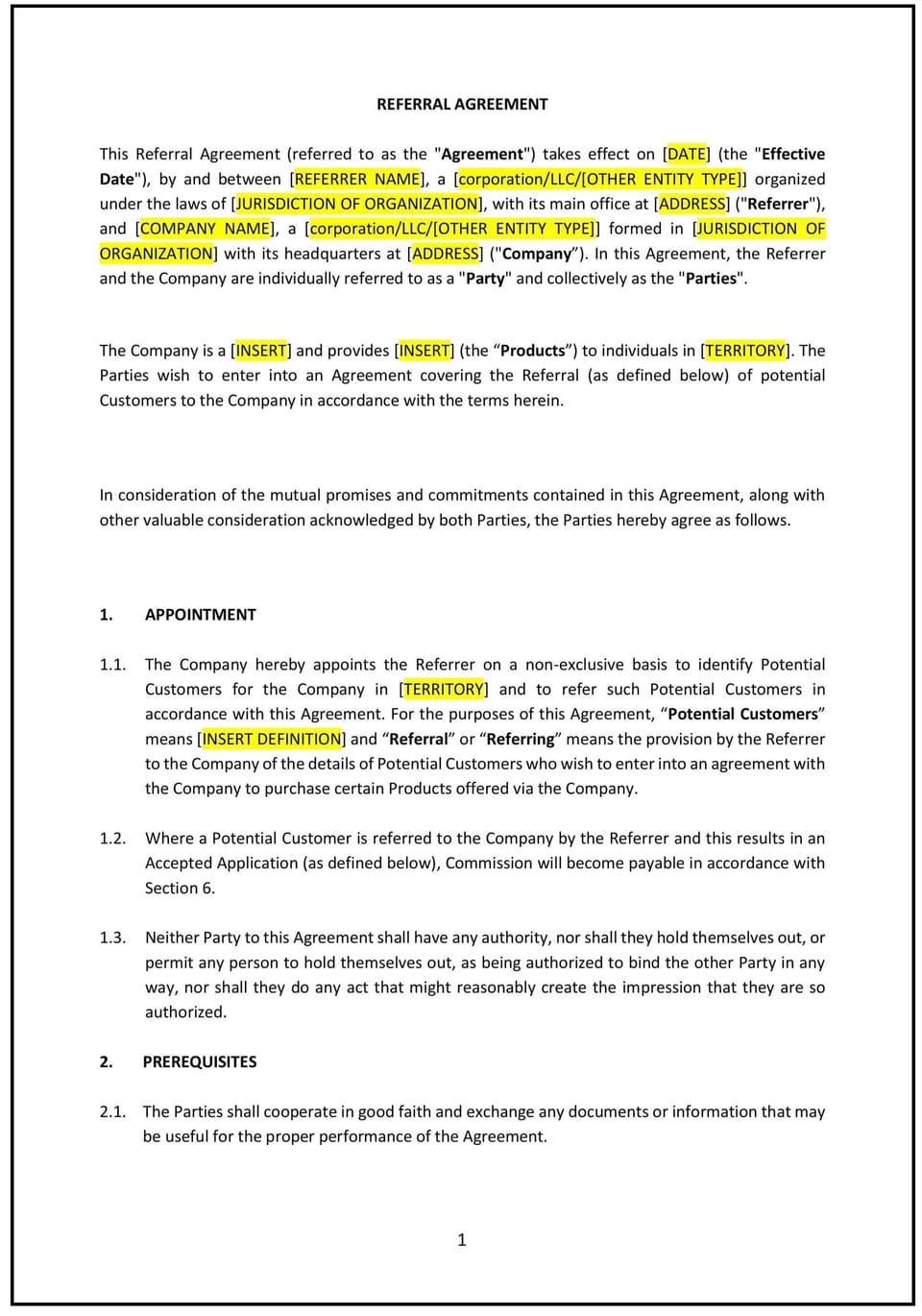Referral Agreement (Tennessee): Free template

Referral Agreement (Tennessee)
A Referral Agreement in Tennessee is a legally binding contract between a business and an individual or entity that refers potential customers in exchange for compensation. This agreement ensures both parties understand the referral process, commission structure, and any applicable restrictions. It is commonly used in industries such as real estate, consulting, technology, and professional services, where businesses rely on third-party referrals to generate leads.
Tennessee businesses use referral agreements to formalize referral relationships, avoid disputes over commissions, and ensure compliance with state contract laws. A well-drafted agreement protects both the business and the referrer by clearly outlining commission rates, payment schedules, and the conditions that must be met before a referral is considered successful.
For businesses operating in Tennessee, this agreement helps create structured and legally enforceable referral arrangements, reducing the risk of non-payment, disputes over commission eligibility, and unauthorized solicitation of clients. Some industries, such as real estate and healthcare, may have additional regulations governing referral fees, and businesses should ensure their agreements comply with Tennessee law.
Tips for drafting and maintaining a Referral Agreement in Tennessee
- Clearly define what qualifies as a successful referral to prevent disputes over commissions or payments. The agreement should specify whether a referral is considered successful upon lead conversion, contract signing, or full payment.
- Specify payment terms, including commission percentages, invoicing procedures, and timelines for payouts. Tennessee law requires certain industries, such as real estate, to follow strict commission payment guidelines.
- Clarify whether the agreement is exclusive or non-exclusive, determining if the referrer can work with multiple businesses offering similar services.
- Include confidentiality and non-circumvention clauses to protect business relationships and prevent the referrer from directly engaging with referred clients outside of the agreement.
- Ensure compliance with Tennessee contract laws, including any industry-specific regulations, such as Tennessee’s real estate broker commission laws and federal anti-kickback statutes for healthcare-related referrals.
Frequently asked questions (FAQs)
Q: What should Tennessee businesses include in a Referral Agreement?
A: Businesses should include the referral criteria, payment terms, exclusivity clauses, confidentiality provisions, and termination rights to ensure clarity and enforceability.
Q: How does a Referral Agreement benefit businesses in Tennessee?
A: It provides a structured way to generate new business leads while ensuring referrers are fairly compensated, reducing misunderstandings and disputes.
Q: Are referral fees enforceable under Tennessee law?
A: Yes, referral fees are generally enforceable as long as the agreement is clear, legally compliant, and does not violate industry-specific regulations such as anti-kickback laws.
Q: Can a Referral Agreement in Tennessee include an exclusivity clause?
A: Yes, businesses can specify whether referrers are allowed to work with competitors or must refer exclusively to one company.
Q: How should businesses handle disputes in a Referral Agreement?
A: Businesses should include a dispute resolution clause specifying whether disputes will be handled through arbitration, mediation, or Tennessee courts.
Q: Do Tennessee laws require written Referral Agreements?
A: While verbal agreements can be enforceable in some cases, a written agreement provides greater legal clarity and protection, especially for commission-based referrals.
Q: Are referral agreements legal in all industries in Tennessee?
A: Most industries allow referral agreements, but businesses in real estate, healthcare, and legal services should review Tennessee laws and federal regulations to ensure compliance.
This article contains general legal information and does not contain legal advice. Cobrief is not a law firm or a substitute for an attorney or law firm. The law is complex and changes often. For legal advice, please ask a lawyer.


